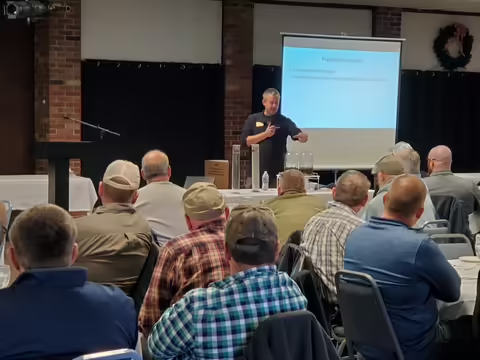COVINGTON, IN – Bi-State Crops Conference
Over 70 growers from Illinois and Indiana gathered Thursday, December 1, for the Bi-State Crops Conference held at the Beef House Restaurant in Covington, Indiana. A collaboration between University of Illinois Extension and Purdue University Extension, the conference draws knowledge from experts at both schools, extending research to area growers and farm managers.
Illinois Extension Educator and event organizer Ryan Pankau said, “The speakers for this year’s crops conference were outstanding, each bringing valuable, research-based information to our growers. With topics ranging from soil health to weather forecasting, I think all the participants left with some new ideas to implement in their own operations.”
Barry Fisher of Fisher Soil Health, LLC kicked off the conference with his talk, Building a Soil Health Management Plan, a timely topic as research surfaces revealing the alarming rate of depleting topsoil levels. Fisher spoke about the need for continuous plant cover on our soils, which can be accomplished using cover crops. “The more time throughout the year you can maintain plant cover, the more you can benefit from the natural processes the soil provides,” Fisher explained. He went on to say that keeping soil surfaces bare for months out of the year doesn’t allow soil organisms to proliferate, preventing them from cycling nutrients and maintaining the structure and porosity needed to efficiently exchange water and nutrients within the soil profile.
Building on that topic, Hans Schmitz of Indiana Conservation Cropping Systems spoke about the importance of maintaining soil health for resiliency during extreme weather events. He emphasized using science-based weather services like the NOAA’s (National Oceanic and Atmospheric Administration) over more commercialized applications that lack scientific credentials. Schmitz reviewed current weather trends toward more annual rainfall and larger, more violent storms and related that to the need for more resilient soils to increase infiltration and reduce runoff and erosion.
Purdue Extension Educator Kurt Lanzone spoke with the group about the risks and regulations surrounding the use of anhydrous ammonia, an efficient and widely applied source of nitrogen fertilizer. Using his years of experience as a volunteer firefighter, he reviewed several examples of recent accidents in Indiana and how they could have been prevented.
Closing out the crops conference, Illinois Extension Digital Ag Specialist Dennis Bowman reviewed the 80-acre I-FARM Project taking place on the University of Illinois campus, including the demonstration of a cover-crop-seeding robot. Bowman explained that the advantage of this kind of technology is its ability to plant cover crops under the corn canopy in the late summer, before harvest. Most cover crop applications are limited to post-harvest, leaving growers with narrow planting windows. This earlier timeline also allows growers to utilize a wider variety of cover crop species. Bowman shared, “I enjoy participating in the Bi-State Crops Conference and sharing information about new crop production technologies with farmers and industry professionals from Illinois and Indiana.”
The Bi-State Conference Series continues next month with a Gardening meeting on January 24. Topics include The Social Side of Seeds: Growing Communities and Gardening for Pollinators. To find out more information or to get registered, visit go.illinois.edu/Bi-StateConference.
About Extension: Illinois Extension leads public outreach for University of Illinois by translating research into action plans that allow Illinois families, businesses, and community leaders to solve problems, make informed decisions, and adapt to changes and opportunities.
For Further Information, Contact:
Source: Ryan Pankau rcpankau@illinois.edu
Writer: Mindy Jefferson mindyj@illinois.edu
